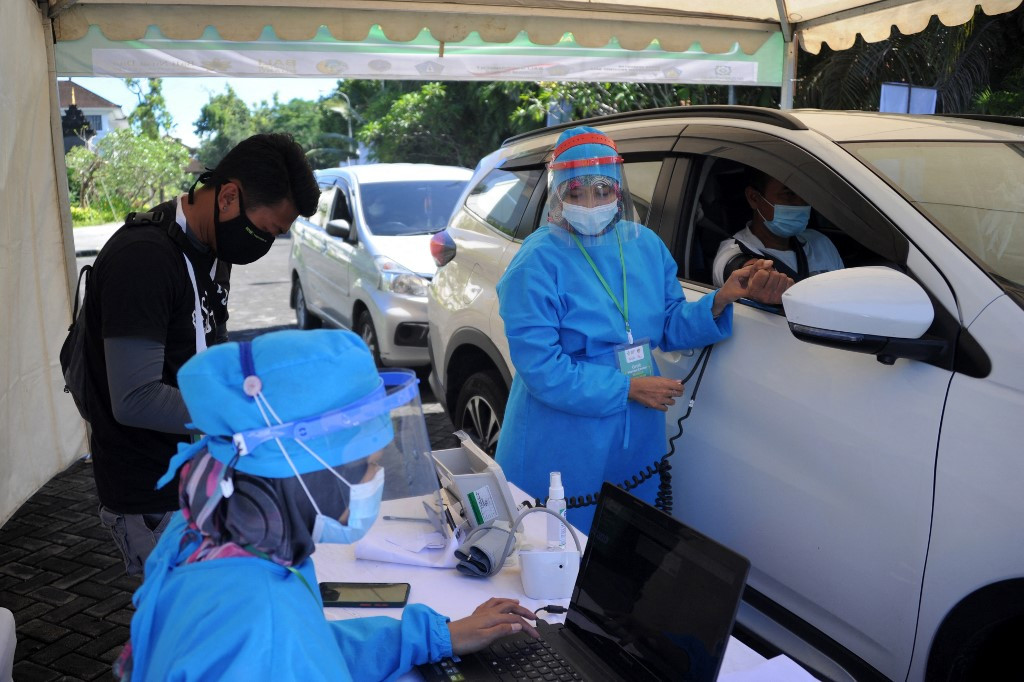Popular Reads
Top Results
Can't find what you're looking for?
View all search resultsPopular Reads
Top Results
Can't find what you're looking for?
View all search resultsNew UK virus variant poses greater challenges
RI to accelerate research, expand analytical epidemiology studies
Change text size
Gift Premium Articles
to Anyone
T
he Health Ministry reported on Tuesday the first two cases of a more transmissible variant of COVID-19 that was originally discovered in the United Kingdom, exactly one year after Indonesia's first local cases were discovered – making the country’s battle with the pandemic more challenging and possibly necessitating a faster vaccine rollout.
Deputy Health Minister Dante Saksono Harbuwono said on Tuesday that he had received on Monday evening a report on the detection of two cases of the British variant, known as B117.
Dante said that, with the detection of the new variant, Indonesia would need to improve its handling of the outbreak, accelerate research and expand analytical epidemiology studies.
“This means that we'll be facing the pandemic with a higher level of difficulty,” he said.
There were no details on where these cases were detected, but national COVID-19 task force spokesperson Wiku Adisasmito told The Jakarta Post that an official statement would be issued later.
Citing several studies, British scientists have said it was “likely” the variant was "associated with an increased risk of hospitalization and death" compared to infection with other non-variants of concern. The scientists revealed their analysis in a document posted last month on the UK government's website that has yet to be peer-reviewed. They meant to provide it with rapid evidence during an emergency.
The variant has been reported in at least 101 countries, according to the World Health Organization. The WHO, citing various emerging evidence, said the variant was 36 percent to 75 percent more transmissible than non-variants of concern. It has also cited studies suggesting that the mutation had no significant impact on the level of protection offered by the Moderna, Pfizer-BioNTech and Oxford-AstraZeneca vaccines.
Indonesian Institute of Sciences (LIPI) biotechnology researcher Wien Kusharyoto, one of the scientists working to detect emerging variants in the country, said that, while there was no reason for panic for now, the government would have to accelerate COVID-19 vaccination, especially among at-risk groups, to suppress hospitalizations and deaths.
These refer to the elderly as well as people with comorbidities who, unlike the former, have not been specifically prioritized by the government in the vaccination drive.
Read also: Will Indonesia’s preordered COVID-19 vaccines protect against new variants?
The country, he said, would also need to use vaccines proven to provide protection against variants of concerns -- not only the one first detected in the UK but also those first found in South Africa and Brazil.
In general, currently available vaccines were believed to still offer protection against these variants of concerns, he said, but the government would still have to make sure how much protection could be offered by one particular vaccine it was currently using: CoronaVac from Chinese firm Sinovac Biotech.
Sinovac's Brazilian partner said last month that testing in China of the vaccine against the variants first found in the UK and South Africa showed "good results" without offering more details, Reuters reported. It said it was testing the vaccine against the variant found first in Brazil and was expecting similar results.
"But, the very first thing to do is to track whether the UK variant has been widely spread in the region where it was first found in Indonesia -- which will require upscaled whole-genome sequencing," Wien said.
Whole-genome sequencing is another weak link in Indonesia’s coronavirus fight, with labs facing insufficient equipment and high costs for processing positive samples to determine the complete DNA sequence needed to detect emerging variants.
The country had so far performed whole genome-sequencing on 462 cases over the past few months, Dante said. This represents 0.03 percent of the country's confirmed cases.
Read also: Genome surveillance another weak link in Indonesia's coronavirus fight, experts warn
With the existing limitations, Wien said, labs capable of genome surveillance should focus on the region where the variant was detected and also on regions where there had been a sudden spike in cases.
There is no other way for Indonesia than to improve its testing and tracing, followed by whole-genome sequencing, said Herawati Sudoyo, a senior researcher at Indonesia's Eijkman Institute for molecular biology. Eijkman's lab aims to run whole-genome sequencing on 5,000 samples this year.
"The best strategy, assuming there's still no local mutation, is to carry out surveillance in the country's ports of entry [...] that are accepting travelers," she said.
Epidemiologist Dicky Budiman said the detection of the UK variant should not come as a surprise given the loose border restrictions and quarantine requirements for inbound travelers from abroad.
Indonesia requires five days of quarantine for travelers, which Dicky said was not on par with best practices abroad that required 10 or more days of quarantine. He said it was also not enough to only mandate hand-washing, mask-wearing and social distancing without limiting mobility, and at the same time it was necessary to improve testing, tracing and isolating efforts.
Wiku said the government was open to changing its policies on foreign arrivals if deemed necessary by considering the developing situation.










